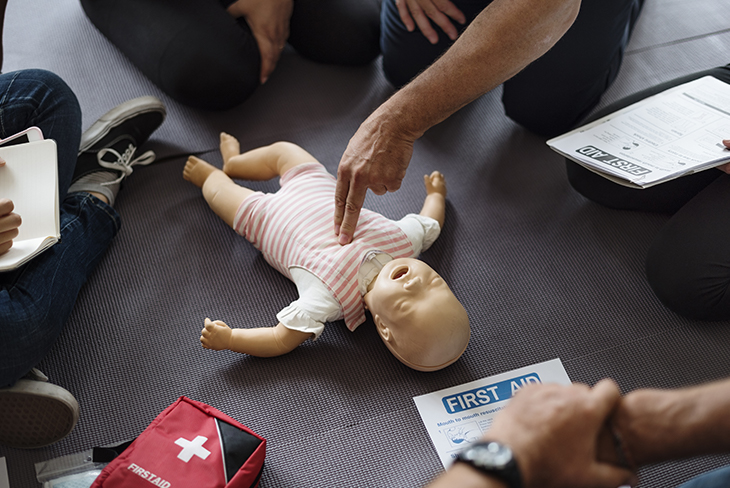The basics of baby CPR

Before infants are discharged from neonatal intensive care at Life Flora Hospital, their parents are now being offered basic training in baby CPR.
What would you do if your baby stopped breathing? Would you know how to perform CPR (cardiopulmonary resuscitation)?
Nobody really knows how they’ll cope in a medical emergency. However, learning basic CPR skills can give you the confidence to take action in an emergency, rather than panicking and doing nothing. This is why Life Flora Hospital in Johannesburg has introduced a Baby Basics programme in its neonatal intensive care unit (NICU) to teach parents the fundamentals of infant CPR.
‘We believe in empowering parents so that they feel confident about taking care of their baby by teaching them how to perform CPR on their little one before they leave the hospital,’ says Nurse Asha Jagaesar Roy, manager of NICU at Life Flora Hospital.
Nurse Asha explains, ‘When a baby is in NICU the parents know that in an emergency, the specialist skills are always there. But often they feel helpless after their child has been discharged. Parents question themselves and lack confidence regarding emergency situations.
‘Many of the babies in NICU are premature and therefore there is prolonged hospitalisation. This has an impact on bonding due to limited handling of the baby, and parents need reassurance, training and education to prepare them for their baby’s discharge.’
Life-saving skills
Darren van Zyl, a paramedic registered with the Resuscitation Council of Southern Africa (RCSA), explains the significance of the training.
‘The Baby Basics programme was developed in conjunction with the RCSA in an effort to fulfil a need to train as many parents as possible in the life-saving skills of CPR and relief of choking,’ he says. ‘The best thing you can do in an emergency situation is to stay calm and if you know basic infant first aid, you will cope a lot better than someone who hasn’t had training.
‘The CPR guidelines are the same for everyone regardless of their age,’ says Darren. ‘However, there is a greater emphasis on providing breaths to babies and children than for adults.’
Adds Nurse Asha: ‘Babies’ physiology is slightly different from adults’ because they are small: their heart and breathing rates are faster to accommodate their faster metabolic rate for growth.’
Life Flora Hospital has a team of eight Basic Life Support instructors registered with the RCSA who conduct and oversee the training, which has received much positive feedback from parents since it was introduced. ‘The Baby Basics CPR programme is not a certification course but rather a demonstration (with some opportunity to practise) of what to do in an emergency,’ says Darren.
The pioneering initiative goes to show that at Life Healthcare, the emphasis is on ‘care’, even after you and your baby are discharged from hospital.
Basic baby CPR
Here’s what to do in the event your baby is in distress, as per the Baby CPR Kit:
- Tap the infant’s feet firmly and check for a response. If the infant does not respond and is not breathing, place him or her on a firm, flat surface and call for help.
- Place two fingers in the centre of the infant’s chest and begin 30 chest compressions.
- Cover the infant’s nose and mouth with your mouth and give two breaths until you see the chest rise. Repeat 30 chest compressions, alternating with two breaths.
Visit the Resuscitation Council of South Africa Facebook page on www.facebook.com/ResusCouncilSA
The information is shared on condition that readers will make their own determination, including seeking advice from a healthcare professional. E&OE. Life Healthcare Group Ltd does not accept any responsibility for any loss or damage suffered by the reader as a result of the information provided.

